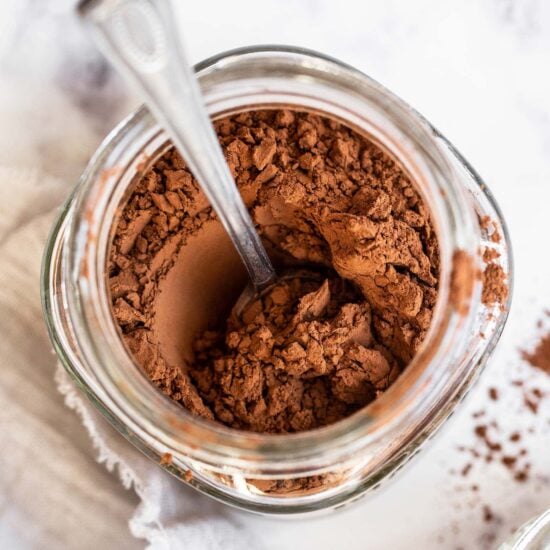
Natural Cocoa vs. Dutch Process Cocoa Powder
This post may contain affiliate links. Read our disclosure policy.
If you’re a chocoholic like me, you probably find yourself using cocoa powder often. You might have wondered before how natural unsweetened cocoa powder is different than Dutch process cocoa powder. And, if one can be substituted for the other. Since Dutch-process is harder to find, you’ve probably also wondered if you really need to use it.
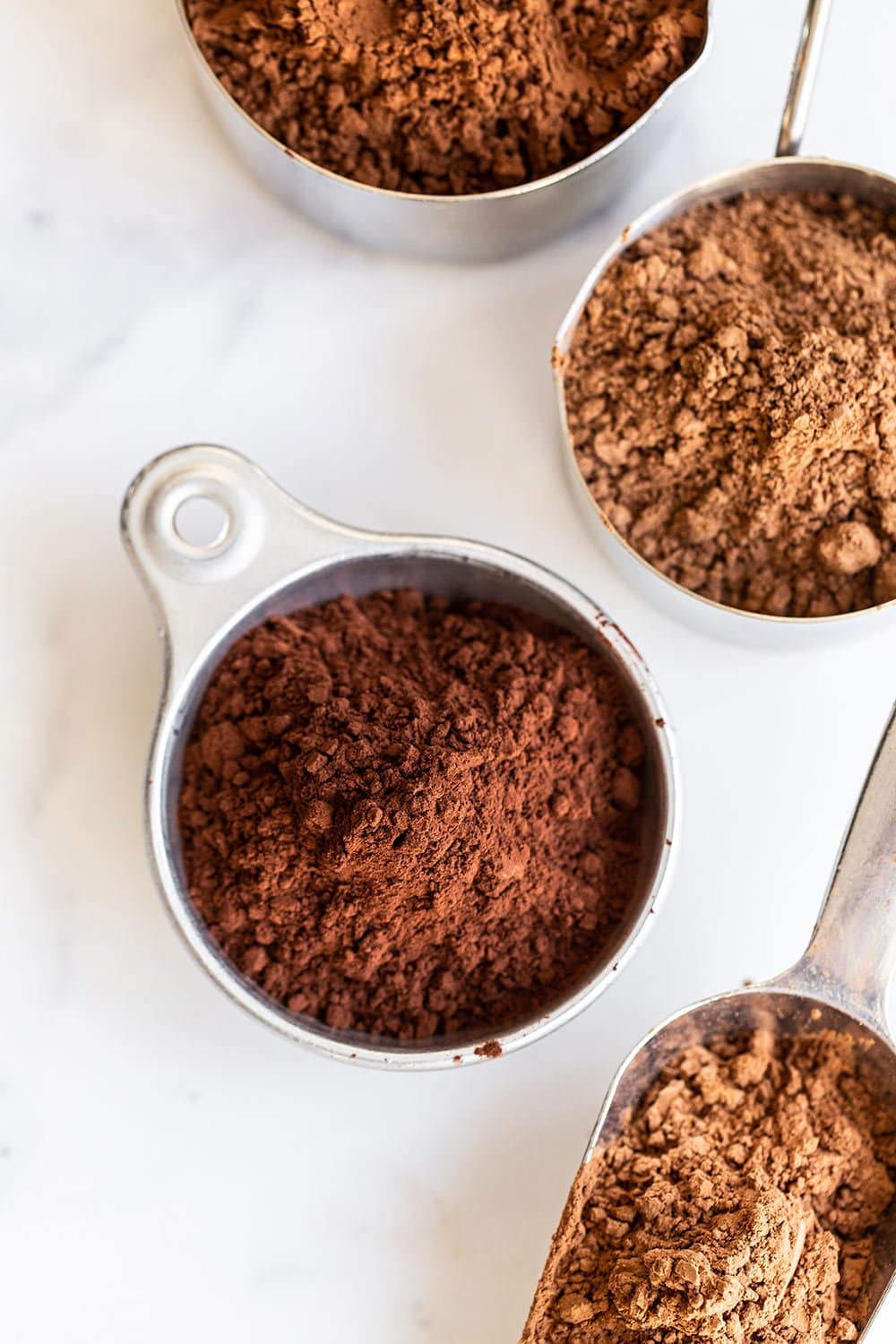
Today I’m going to be showing you exactly what the differences between these cocoa powders are, including how they affect your baking and how you can substitute. If you want to improve your baking, be sure to watch the video explanation below!
While it’s important to learn about Natural vs. Dutch Cocoa, read my article here to learn the secret #1 MOST IMPORTANT thing about cocoa powder. The answer may surprise you and it’s something most people had no idea about!
Natural Cocoa vs. Dutch Process Cocoa Powder
What is Cocoa Powder?
Cocoa powder is the product resulting from the process of fermenting, drying, roasting, and grinding cocoa beans into a powder.
- The fermented and roasted beans are ground into a paste called chocolate liquor, which is a mixture of cocoa solids and cocoa butter.
- Some of that chocolate liquor is used to make chocolate candy and bar products.
- The rest is pressed further to remove most of the cocoa powder (which is also used to make chocolate).
- The cocoa solids that remain are ground into what becomes cocoa powder.
What is Natural Cocoa Powder?
- Medium brown in color and bitter in flavor
- Is popular in American brownie and cake recipes (think Devil’s Food Cake)
- Brands such as Nestle, Ghirardelli, and sometimes Hershey’s are natural cocoa powders
What Kind of Leavener Works with Natural Cocoa Powder?
Due to the fact that natural cocoa powder is highly acidic (pH between 5 and 6 typically), it’s often paired with baking soda as a leavener, since it’s a naturally alkaline ingredient. Basically, this just means that baking soda helps neutralize that acidity.
Is Unsweetened Cocoa Powder the Same as Natural Cocoa Powder?
Yes! Different names for the same thing.
What is Dutch-Processed Cocoa Powder?
Dutch-Processed or Dutched cocoa powder has a few properties that set it apart from natural cocoa powder:
- It’s made from cacao beans that have been washed with a potassium solution to neutralize their acidity from a pH of 5 to a pH of about 7
- This means that Dutch process cocoa powder is only slightly acidic, because of that ‘Dutching’ process
- This process also softens the flavor
- Dutch process cocoa powder is more commonly found in Europe
How do I Tell if a Cocoa Powder is Dutch-Processed?
To figure out if a cocoa powder is Dutch-processed or natural, look out for the words “Dutched,” “cocoa processed with alkali,” “alkalized,’ or “European style” on the packaging, all of which mean it’s Dutch-processed.
What Kind of Leavener Works with Dutch-Processed Cocoa Powder?
- Oppositely from natural cocoa, Dutch-process cocoa is typically paired with baking powder as a leavener since the acidity has already been neutralized.
- Dutch-process cocoa powder actually won’t react to baking soda, meaning if you pair the two together without any other acid in a recipe (like brown sugar, lemon, or yogurt), you won’t get much leavening effect.
- Learn more about leavening agents in my article about the differences between baking soda and baking powder HERE.
Where to Buy Dutch-Processed Cocoa Powder?
You can often find it a more specialty of gourmet stores such as Whole Foods, Williams Sonoma, Sur la Table, Penzey’s, or simply purchase it online from Amazon or King Arthur Flour. I really like E. Guittard, Bensdorp, and Penzey’s.
What do the Differences in Color Signify?
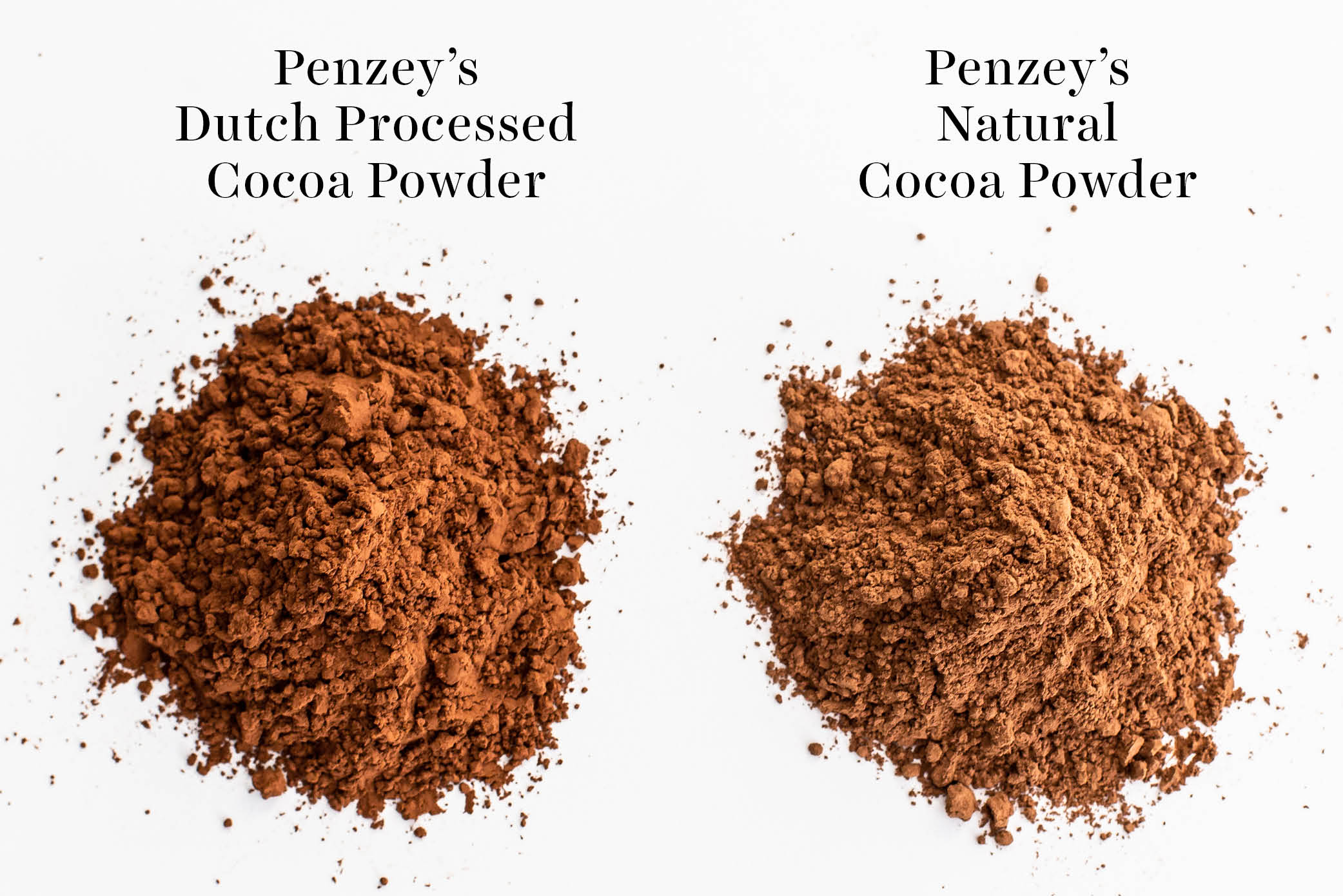
What’s perhaps most immediately noticeable about Dutch cocoa is its rich, deep, and sometimes reddish color, which is a byproduct of Dutching. Contrast that with the lighter tan color of natural cocoa. However, color isn’t always an indicator of quality or chocolate flavor (see Black Cocoa Powder below).
Is Hershey’s Cocoa Powder Dutch Processed?
Hershey’s “Special Dark” cocoa powder is indeed Dutched. Their regular “natural unsweetened” is not Dutched.
What is Black Cocoa Powder?
The ever-popular Oreo cookie is made with highly Dutched cocoa powder, sometimes called black cocoa. It imparts that characteristic dark color but very little chocolate flavor or fat, resulting in a more dry or crumbly product (more on fat below).
What is Cacao Powder?
- In cacao powder, the beans are processed at temperatures low enough that the final powder is considered ‘raw.’
- This means it has more nutrients, but is also much more bitter.
- Cocoa powder goes through a process of roasting and higher heat exposure which means it is not raw and loses some of its nutritional value. That’s what helps to make regular cocoa powder less bitter.
- I don’t bake with cacao powder. In part because of its bitter taste, but also because most recipes I use cocoa powder in are baked, which would strip the more expensive cacao powder of those raw nutrients.
Are Dutch-Processed and Natural Cocoa Powder Interchangeable?
- The answer is: sometimes. They can be used interchangeably if there is no baking soda or baking powder called for in the recipe.
- Leavener-specific. If a specific leavening agent is called for, your best bet is to stick with the cocoa powder specified.
- Altering the texture. When there is more than 3/4 cup of cocoa powder called for in the recipe and you do not use the cocoa powder specified, you really risk altering the intended texture.
- Generally, you will have more success substituting natural cocoa powder for Dutch-processed cocoa, but less success the other way around.
- Stick with the recipe whenever possible. Since baking is a science, it’s best to be precise and follow the recipe exactly, to eliminate the possibility of mistakes. Especially since good cocoa powder isn’t cheap!
- Important note: you can’t substitute sweetened cocoa for unsweetened cocoa in recipes, and you can’t substitute with bars of chocolate.
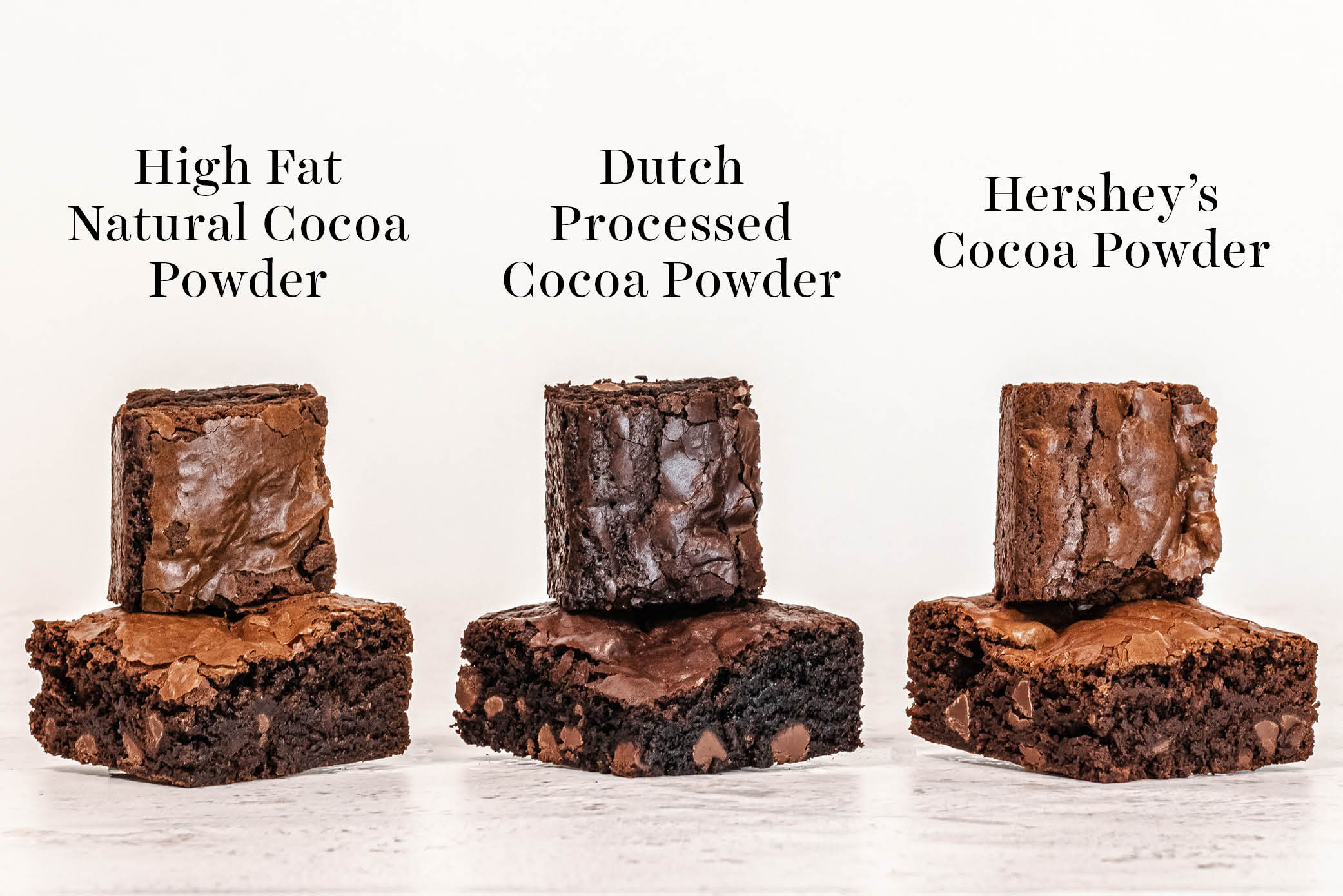
What if the Recipe Doesn’t Specify the Type of Cocoa Powder to Use?
If a recipe doesn’t specify or offers you the choice between the cocoa powders, note that one isn’t necessarily ‘better’ than the other – but there are differences in flavor and color:
- Dutch-processed cocoa will create a darker product with a smoother, mellower, and more earthy flavor.
- Using natural cocoa powder will create a lighter-colored product, with a slightly fruiter and more astringent flavor.
- I personally find natural cocoa powder to be more reminiscent of childhood chocolate treats in America.
How to Store Cocoa Powder
Store in a cool dry place in an airtight container and use within 1 year of purchase. Don’t refrigerate or freeze, which promotes moisture and therefore spoilage.
Can I Add Cocoa Powder to Any Recipe to Make it Chocolate?
No. As mentioned above, cocoa powder contains starch, which makes it a drying ingredient. It will often alter the entire chemistry of a recipe if you try to take a vanilla cake, sugar cookie, or blondie recipe and add cocoa powder. The one exception is for American buttercream, which you can usually add cocoa powder to without issue.
Best Cocoa Powder Recipes:
- Flourless Chocolate Cake (Dutch-Processed Cocoa)
- Brown Butter Brownies (Dutch-Process Cocoa)
- Best Ever Chocolate Buttercream Frosting (Dutch-Process Cocoa)
- Chocolate Brownie Cake with Peanut Butter Frosting (Natural Cocoa)
- Cosmic Brownies (Unsweetened Cocoa)
- Gooey Chocolate Cinnamon Rolls (Unsweetened Cocoa)
Pin for later:
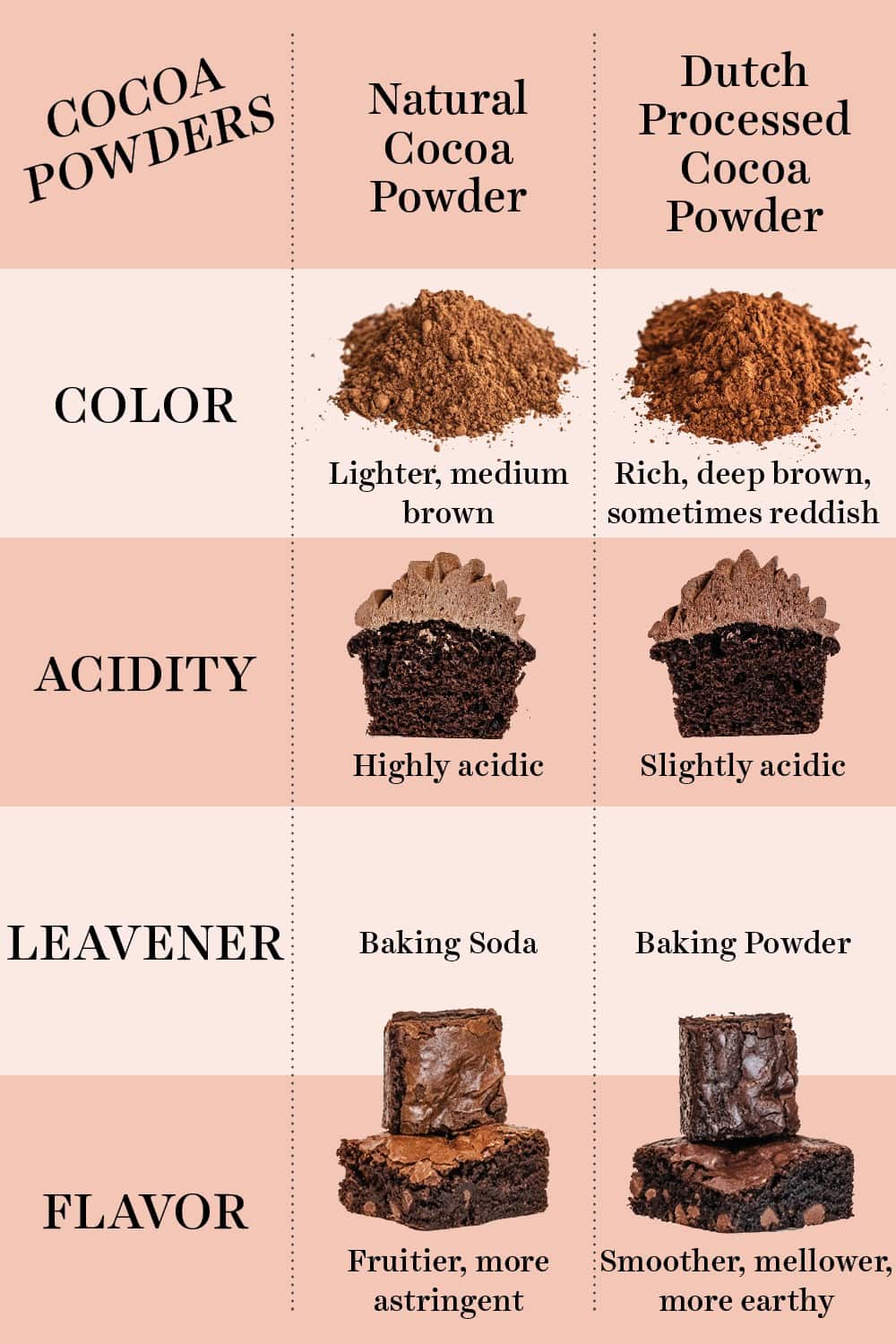
About Tessa...
I share trusted baking recipes your friends will LOVE alongside insights into the science of sweets. I'm a professionally trained chef, cookbook author, and cookie queen. I love to write about all things sweet, carb-y, and homemade. I live in Phoenix, Arizona (hence the blog name!)
Leave a Comment & Rating
Add a Review or Question
© Handle the Heat - handletheheat.com
Join the Handle the Heat Community
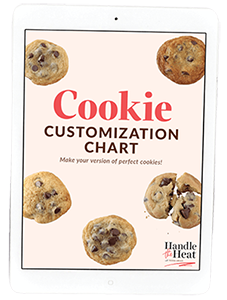
Instead of digging through cookbooks and magazines and searching the internet for amazing recipes, subscribe to Handle the Heat to receive new recipe posts delivered straight to your email inbox. You’ll get all the latest recipes, videos, kitchen tips and tricks AND my *free* Cookie Customization Guide (because I am the Cookie Queen)!



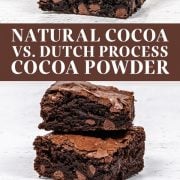
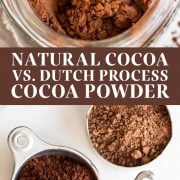
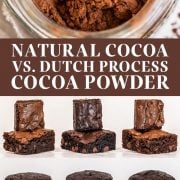
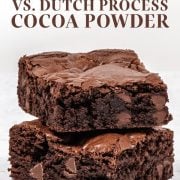
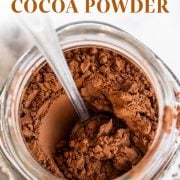
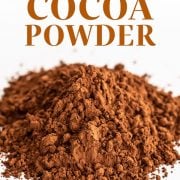
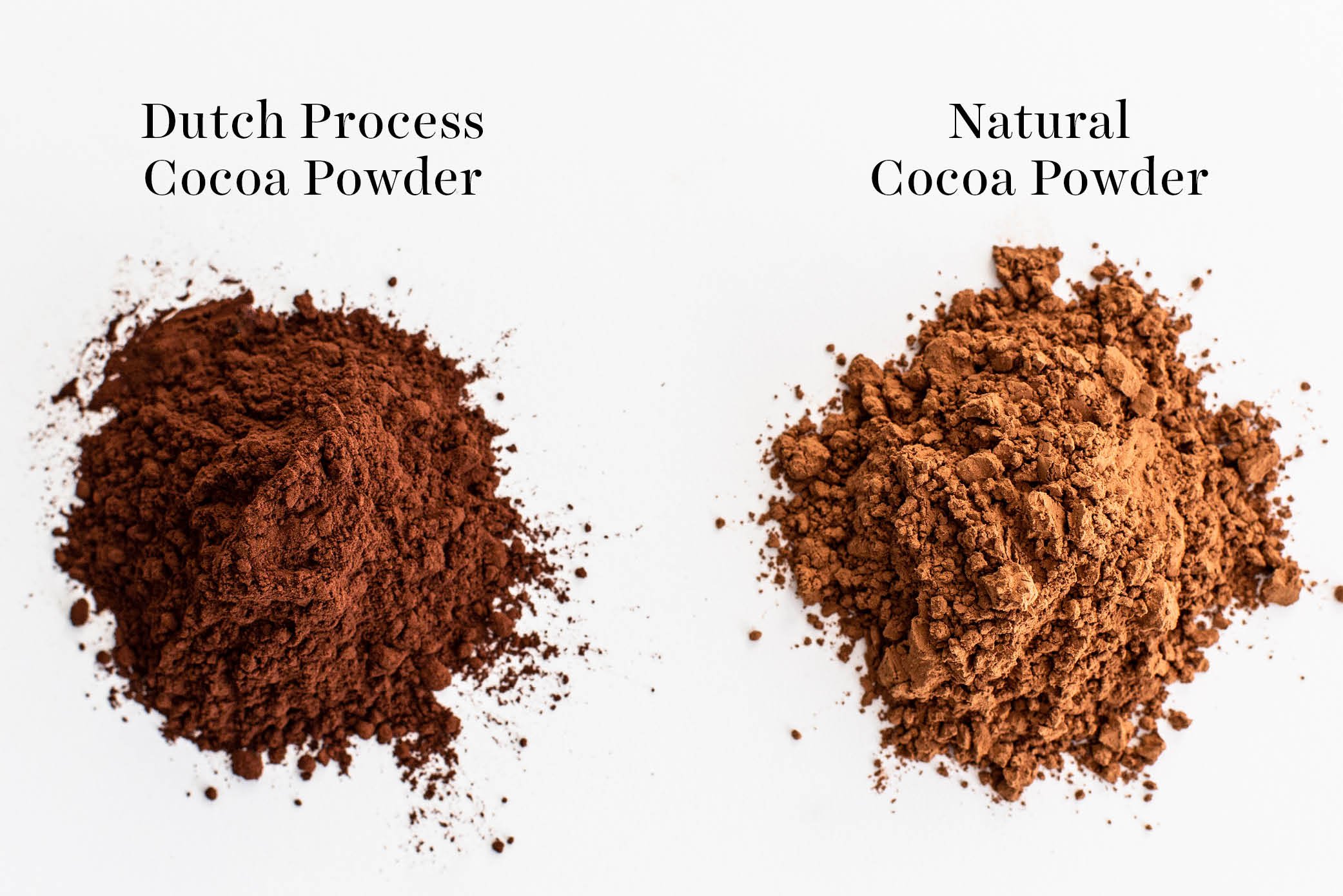
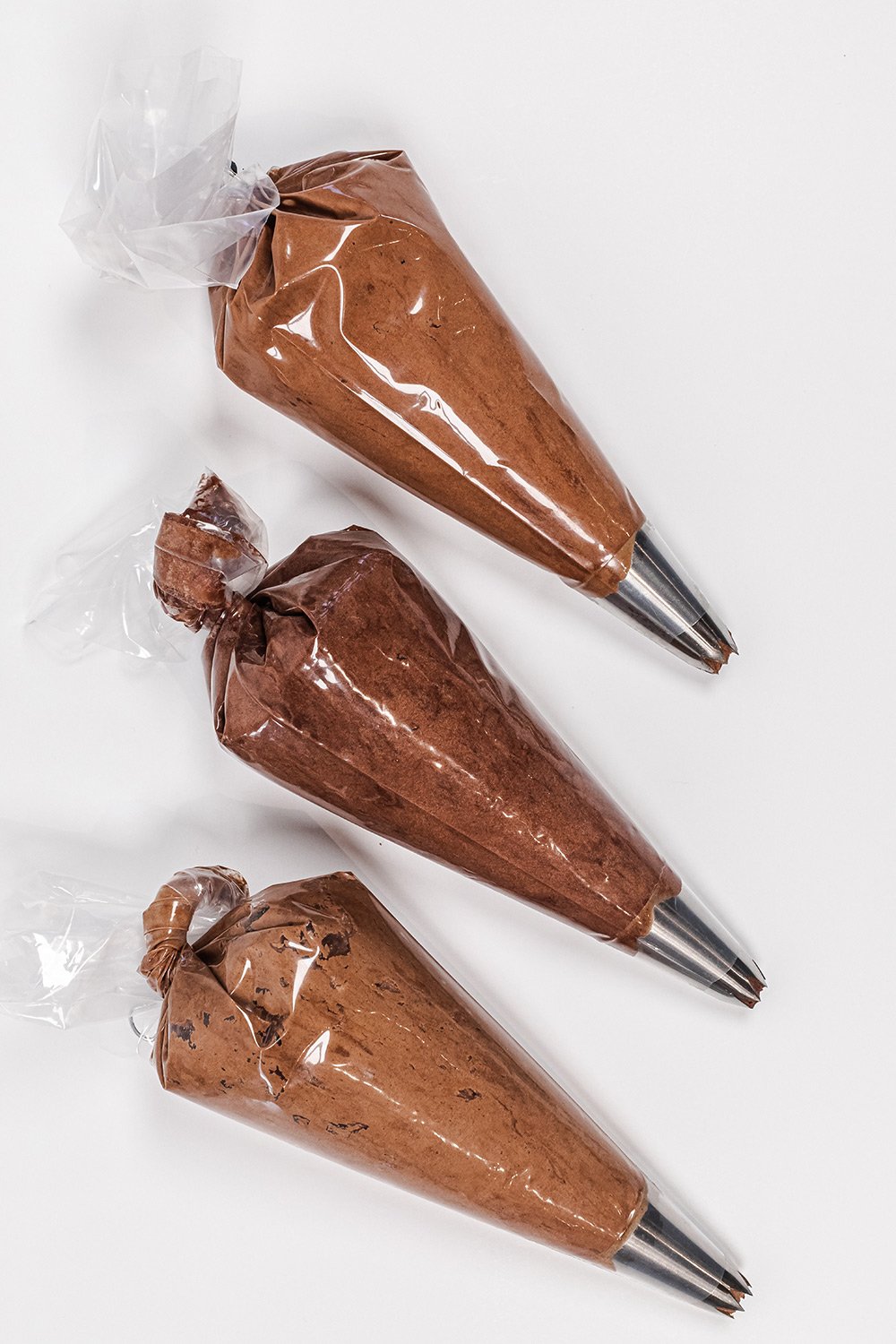
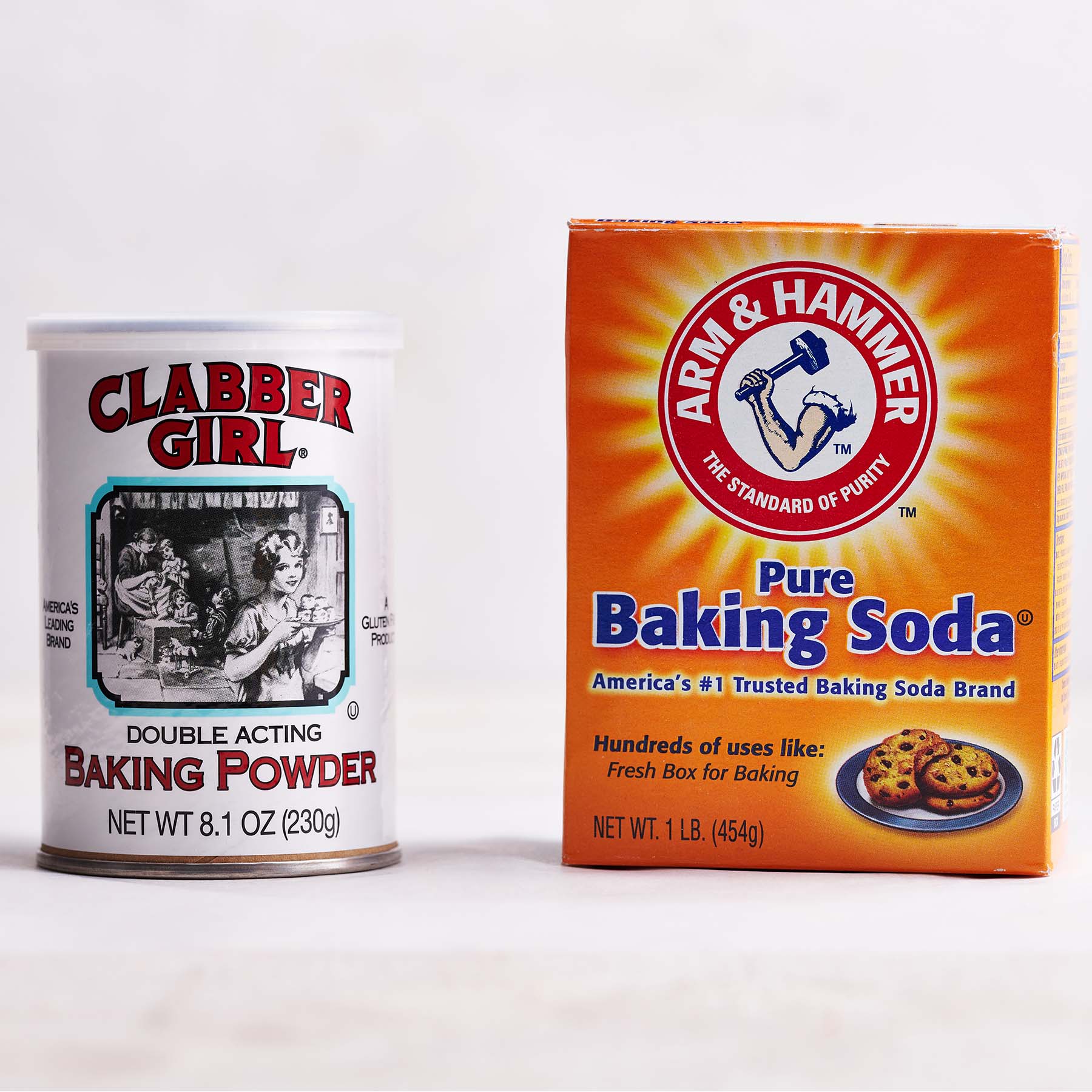
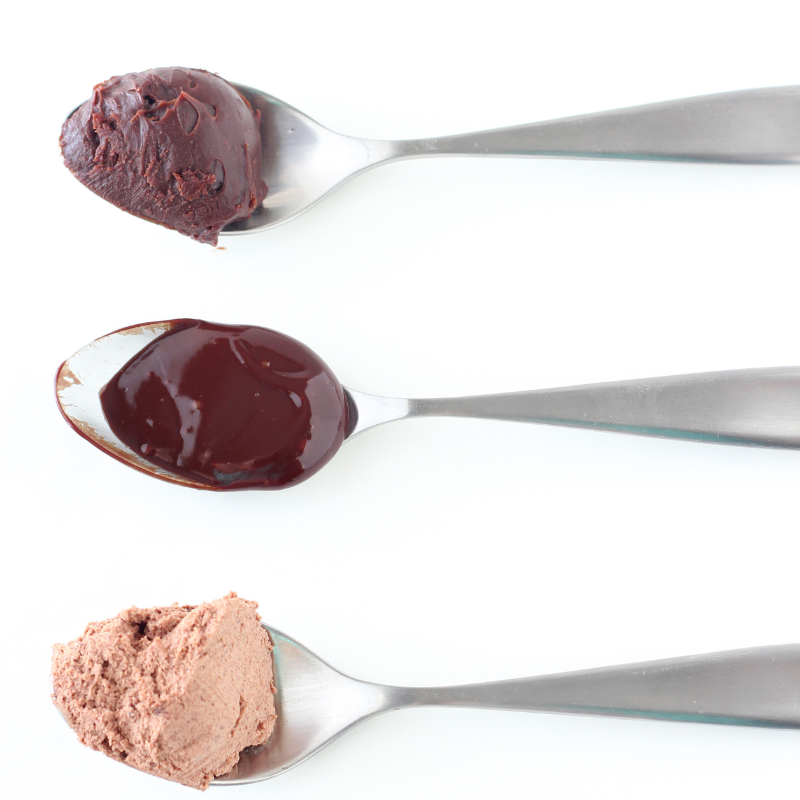



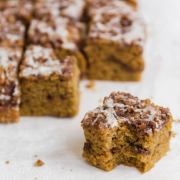
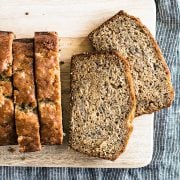


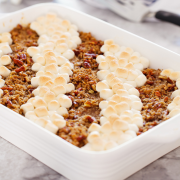
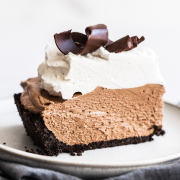
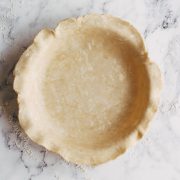


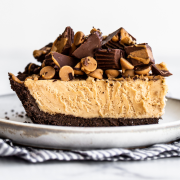
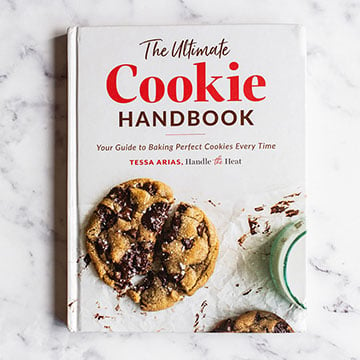
I found this info to be enlightening and valuable. Thank you for taking the time to make this video and page.
Hi Tessa, thank you for the great info.
I wonder if Dutch processed cocoa will be suitable for my chocolate cake recipe that calls for both baking powder and baking soda and vinegar.
I’m planning to try it out. I’ve been using Hershey’s all this while.
Hi Jerusha! We only recommend using the cocoa powders interchangeably if there is no baking soda or baking powder called for in the recipe. If a specific leavening agent is called for, your best bet is to stick with the cocoa powder specified. If your chocolate cake does not specify, go for it! Let us know what you think!
Very informative and to the point. Thank you for answering a number of questions that were in my mind. I liked the summary table near the end. I might suggest adding a cacao column. My wife recently bought cacao powder (Dr Oetker’s brand) and we did not find it overpoweringly bitter. Maybe different people define things in slightly different ways? Looking for the difference between cacao and cocoa was what led me to your page.
Hi John! Thanks for the feedback! Tessa notes why cacao isn’t included when she talks about cacao powder in the article. Using cacao powder in baked recipes strips the cacao powder of those raw nutrients, which for us personally makes it not worth using in recipes, especially as it’s pretty expensive. It is definitely a personal preference though, and you’re welcome to give it a try!
Hi Tessa. i am a bit confused. Is Dutch Processed Cocoa the same as Unsweetened Cocoa?
I want to make Red Velvet Cake. the recipe has no baking powder, but contains vinegar, buttermilk and baking soda. The recipe also calls for unsweetened cocoa. should i use Unsweetened Cocoa? Natural Plain Cocoa, or Dutch Processed?
What will; happen if i use Dutch Processed?
Plz help me out.
Thnx!
Unsweetened cocoa powder is the same as Natural cocoa powder. Please read the section underneath “What is Dutch Processed Cocoa Powder” where it discusses what kind of leavener works with Dutch processed cocoa powder 🙂
I am a frustrated cottage business baker. I have used Hershey’s special dark for many years and gotten the rich dark cocoa buttercream color and flavor that my customers love. For whatever reason Hershey’s decided to fix what wasn’t broken and came up with a new formula which now makes my buttercream much lighter in color and with a reddish hue. ugh! I read about the differences in the black cocoa (thinking I would just add some of that) and wondering if the flavor really is that much less that it would make a difference? Or could I just do a ratio of 1:1 black and regular? I don’t want to sacrifice flavor for appearance, but I would like to have the dark color to enhance the flavor. It’s kind of like the whole clear Pepsi thing. It doesn’t taste right if the color is wrong. LOL
Oh, how frustrating for you! I hate when companies do that! You could try experimenting with black cocoa, BUT it really doesn’t have any chocolate flavor to it at all. You’ll get the coloring you want, but no flavor…
Have you tried Nuts.com Dutch processed cocoa?
Hi!
Love the chocolate post.
Still a little confused about the diff between the Dutch process and the “natural” powder. I bought the 365 brand from Whole Foods thinking it was the healthiest product. But on the description of this product it states it’s “processed with alkali” …does this process eliminate some of the healthy nutrients that cocoa offers?
Thank you! Gilbert
funny thing husband was in the room while i was watching so all he could do was listen he commented no humms no uuuughs no stuttering very thorough explanation. LOL thought i would let you know a non baking comment, as for me i will have both types available in house from now on.
thanks Judy
Hahaha! Love this.
Do you have another cocoa choice to buy since the Rodell isn’t available? Thank you
Do I need to increase/decrease the quantity of sugar depending on the cocoa powder I use?
I have learned so much from you. Thank you for explaining things so well. I look forward to making this cake. I am confident it will turn out great.
Coco unsweetened powder taste bitter and the tuffle taste terrible. Can you use sweetened coco to roll tuffles in.
Hi,
I have a question about your description of taste between Dutch process vs natural. Would you say that a Dutch process has a dark chocolate flavor and a natural cocoa has a milk chocolate flavor?
Since I’m a bit of a purist, I always use natural cocoa. I find that it tastes infinitely better than dutch processed cocoa. When the acids are neutralized during the dutching process, many of the natural chocolate flavors are neutralized as well. (Think decaf vs. regular coffee, a similar process). Besides, I’m not crazy about my food being chemically messed with in any way!
If recipe calls for dutch and I only have Nestle cocoa and there is no baking powder or soda in recipe how much baking soda would I add if recipe only calls for 2 tbsp of dutch cocoa?
I also have a recipe that calls for Dutch Processed cocoa + baking soda. But there’s not brown sugar. I’m guessing that the buttermilk is the acid that causes leavening with the baking soda?
Yep, sounds that way!
I have the same question as Chris. It calls for Dutch Processed baking aoda. But it does have brown sugar. Will it still rise correctly and taste okay?
I have a recipe that is calling for dutch process cocoa and baking soda. Should I switch one ingredient out to correct the leavening issue.
I made chocolate cookies with dutched cocoa and drained, chopped sauerkraut (yes, sauerkraut) added, because I’m always looking for interesting additions to plain chocolate cookies. They’re good! I used 1 tsp. baking powder and 1/2 tsp. soda for a recipe that called for 1/3 cup cocoa. I assume that the soda helped neutralize the acid in the kraut; at any rate, the cookies rose just fine and are moist and tender.
I am a chocolate aficionado and love your tips and recipes to use chocolate in several forms. About natural cocoa vs dutch processed cocoa, you suggested using some baking soda to reduce the acidity of the natural cacao. Can you give me an idea of how much baking soda I should add (i.e. 1 tsp per x grams of cocoa)?
Thanks,
Eduardo
Hi Tessa;
I love a challenge 🙂
I made the the same recipe and tried to control as many variables as possible. The only change in ingredients was to the cocoa powder–one was natural unsweetened, the other used dutch processed. One version had “user error”–just a small bit of extra water, but that has happened to me with no-knead breads in the past so I’m familiar with how that impacts the finished product.
My original intention was to find out if added alkali had any impact to the yeast and I would say that it likely does not–the breads both came out the same, with the small variation that I believe the extra water had on the one version. They both rose pretty well, and they both turned out to be fairly “chalky” doughs. Very similar in size and consistency. So then I was just left with the taste and for me personally, the natural cocoa powder won hands down. The dutch processed version had an almost mocha flavor to it (there was no coffee added in the recipe) and while some might like that it wasn’t what I was looking for.
It was a fun experiment for sure!
Hi Tessa, great article, thanks so much for the explanation.
I’m curious about using cocoa powder in a yeasted bread recipe. I’ve been searching for a no-knead chocolate bread (I used to buy it in NYC) and frankly I’ve seen recipes with both natural and dutch-processed. I’m wondering how the yeast will interact with the different powders, and if active dry vs. instant yeast makes a difference?
Thanks so much for any insight you can lend!
Mike.
Hi Mike, I really don’t know! I can’t remember a time when I baked a yeast bread with cocoa powder. Let me know how it goes if you give it a try 🙂
It is missing. There is nothing to watch or read
Thank you so much for the information …
Outstanding information. More food science appreciated.
I buy and use Hershey’s Special Dark Cocoa all the time. Thank you for explaining the difference in the cocoa powders.
Thank you. I had no idea about the difference between the two. This explains some baking issues.
Wow! thanks for the explanation! Always wondered the difference, and yes, Dutch pressed is hard to find!
I buy Hershey’s Special Dark Cocoa, which is a blend of natural and dutched cocoas. What are your thoughts on baking with it and adding it to food like yogurt?
It says that the video has been removed by the user?
Sorry about that! YouTube cut off the end of the video somehow so I had to re-upload it. Should be up now!
Great article! I didn’t consider there was that much difference between the two types of cocoa, but this changed my mind. Thank you for the enlightenment!